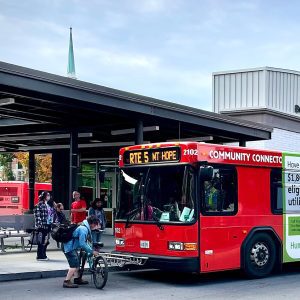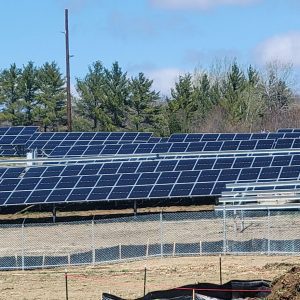The 132nd session of the Maine Legislature produced some big wins for clean energy and conservation but attempts by powerful interests to undermine progress remain. Here’s our detailed assessment of the wins and losses for Maine’s environment.
Among the most significant victories include a new law that sets a goal of 100% clean, affordable, and reliable electricity by 2040 as well as a bill focused on safeguarding the unique ecological and outdoor recreation resources of the North Woods. Legislation to strengthen protections for wildlife and clean water also passed and will become law, ensuring a healthier future for the people and wildlife alike.
More than 50 bills were rejected that sought to roll back progress by undermining existing environmental laws. Most of the proposals, including one to repeal the single-use plastic bag ban and another to weaken the state’s popular Bottle Bill, were defeated, as were attempts to add new taxes on electric vehicles, block development of an offshore wind port, and prevent lawsuits against oil companies.
The Natural Resources Council of Maine is your voice for the environment in Augusta. We mobilize the voices of Maine people and partner with organizations across the state to accelerate progress and stop bad bills.
Continuing Maine’s Legacy of Strong Climate Action
- Two new laws set the stage for delivering more clean, affordable, and reliable energy to Maine homes, businesses, and municipalities. LD 1868 sets a goal of 100% clean electricity by 2040, and LD 1270 establishes a new cabinet-level Department of Energy to streamline statewide procurements of clean energy to maximize efficiency and innovation while ensuring benefits flow to low-income families.
- LD 1 provides more tools and resources for communities to prepare for and respond to extreme weather events and flooding that are becoming worse due to climate change. The bill provides $39 million in the areas of home resilience, enhanced mitigation resources and communications, and a state resilience office and Flood Ready Maine program.
- LD 186, 301, and 1726 will help modernize our electric grid to support a clean energy future by enabling the Public Utilities Commission to pursue innovative areas of electricity policy, like performance-based regulation, time-of-use rates that combine supply and delivery prices, and grid-enhancing technologies and flexible interconnection to make more efficient use out of the grid infrastructure that we have.
- Legislators blocked attempts to revive untested nuclear power technologies. Nuclear energy is prohibitively expensive to produce, would take much longer than clean energy to bring online, and leaves a toxic legacy for future generations.
Safeguarding Maine’s Woods, Waters, and Wildlife
-

Moose coming out of Shirley Bog. Photo by North Woods Aerial
LD 1529 will set the stage for conserving some of the last older growth forests and remote undeveloped ponds in Maine’s North Woods – irreplaceable habitat for wildlife, clean water, and climate mitigation. LD 1308 will support creation of a working group to explore opportunities to maintain public access to land for a wide variety of uses, including recreation, hunting, and research.
- LD 1550 will protect water quality in lakes and ponds by amending the state’s current septic system rules to better promote nutrient removal in sandy soils through natural processes, like what already occurs in fine-grained soils.
- LD 497 will strengthen protections for State-recognized “Significant Vernal Pools,” essential breeding habitat for many amphibians, insects, spiders, and crustaceans, by creating a 100 ft. “no disturbance” zone and closing a loophole that had allowed development to encircle them.
- LD 870 will modernize and strengthen the Land Use Planning Commission (LUPC), which oversees development and conservation in Maine’s unorganized territories. The bill, which we anticipate becoming law without the Governor’s signature next year, will add a tribal member and also an at-large member appointed by legislative leaders. The tribal member is especially important because 80% of the land owned by tribes in Maine is located within the unorganized territories.
- Although the House and Senate passed LD 646 to create a commission that would study sources of storm water pollution to Maine waterways, the costs for the study were not funded by the Appropriations Committee. As a result, the bill has been carried over to next year.
- Multiple bills were introduced this year to provide additional funding to the Land for Maine’s Future (LMF) program, which is running out of money, but no action was taken either to provide an appropriation for LMF or send a bond proposal to the voters. All of the bills will be carried over to next year.
- The Department of Environmental Protection supported passage of LD 25 that would have sent a $50 million bond proposal to the voters to facilitate the management and disposal of wastewater sludge containing PFAS. The money would have been distributed through grants to municipalities, but the bill was carried over to next year – along with many other bond proposals.
Supporting Healthier Transportation Choices Statewide
-

Photo courtesy City of Bangor
LD 1451 requires the Maine Department of Transportation to create a working group charged with developing an implementation plan for recommendations made in this year’s Public Transportation Advisory Council report, which called for increasing state operating funding for transit systems and dedicated funding so that service expansion can be implemented.
- LD 29 and 30 will enable planning and other activities to move forward for new rail trail projects for the Merrymeeting Trail from Brunswick to Gardiner, Casco Bay Trail from Portland to Auburn, and an extension of the Downeast Sunrise Trail to Calais. In each case, the development of trails in these corridors was recommended by a Rail Use Advisory Committee.
- Though the Legislature ultimately did not pass LD 1138, the bill began an important conversation about how the Maine Department of Transportation assesses the climate impact of its proposed projects. The proposal would have followed a model successfully implemented by departments of transportation in a handful of other states for reducing traffic and curbing pollution by expanding investment in healthier transportation choices like reliable public transit and safe biking and walking infrastructure. Read NRCM’s testimony (PDF).
Reducing Waste and Tackling Plastic Pollution
- LD 1605 requires Maine’s largest food waste generators to divert food waste from landfills, aligning with Maine’s climate and recycling goals. The bill creates a new Food Waste Reduction and Recycling Program that would begin in 2030 focused on solutions that increase donations of edible food to hunger relief organization and facilitate food waste recycling. Five other New England states have already passed similar laws.
- Legislators blocked attempts to repeal the state’s ban on single-use plastic bags (LD 69) and weaken the popular Bottle Bill by providing an exception for one company that manufacturers single-use metal cocktail containers that cannot be recycled (LD 1582). A proposal to weaken the existing Extended Producer Responsibility for Packaging law (LD 1423) was amended to minor clarifications to the original bill.
- Lawmakers passed another two-year delay (LD 297) for the ban on out-of-state waste that was enacted in 2022. Casella Waste Systems once again claimed that it continues to need out-of-state waste to stabilize PFAS-containing municipal sludge at the State-owned Juniper Ridge Landfill (JRL), which Casella manages. NRCM and others, including Don’t Waste ME and Penobscot Nation, opposed the delay.
Continued Commitment to Tribal Sovereignty
Even though the tribal sovereignty bill was held until next year’s session and a bill to prohibit eminent domain on tribal lands was vetoed by the Governor, the environmental community remains a strong supporter of the Wabanaki Nations’ tribal sovereignty efforts and will continue to advocate for their inherent rights.
A Few Concerning Setbacks on Clean Energy
-

Part of New England’s largest solar farm in Farmington, Maine. Photo by Beth Comeau
The Legislature missed an opportunity to adopt a reasonable compromise in reforming Maine’s rooftop and community solar programs. Instead, they passed a bill (LD 1777) that goes too far with its changes to our Net Energy Billing program. The law retroactively reduced compensation for existing solar projects, jeopardizing project finances and contracts, and will reduce or eliminate the monthly savings for as many as 100,000 community solar subscribers. The law leaves rooftop solar in place but will sharply limit solar access for future community solar subscribers.
- A misguided and unfortunate new law (LD 556) would curb efforts by communities to move away from fossil fuel dependence. Developed by the natural gas industry and supported by oil dealers, the bill is disguised in the cloak of “energy choice” by mandating that towns cannot limit, for example, natural gas hookups for new homes. The bill was part of a national campaign by the fossil fuel industry to pre-empt municipal decisions that might curb fossil fuel use.
NRCM also experienced an uptick in the number of Maine people taking action through events, emails and other opportunities. Nearly 3,000 people across all 16 counties – and every legislative district – got involved in some way, including testifying on a bill, visiting the State House to speak with their lawmaker, or sending messages to their legislators. A Power Maine Forward Clean Energy Day of Action, organized by NRCM with several coalition partner groups, drew more than 100 participants in May. This followed NRCM’s highly successful State House Action Day in April that connected Mainers with their elected officials.
The Environmental Priorities Coalition, an inclusive statewide alliance of 39 conservation, climate action, and public health organizations, also pursued a slate of priority bills this year. Several were passed, including a bill aimed at preventing future toxic PFAS spills and protecting waterways from storm water pollution. A few, including a tribal sovereignty bill and Energy Fairness Act were held over until next year’s legislative session, and a bill aimed at modernizing Maine’s growth management law was not passed.
Dig into the outcomes of the legislative session:











Leave a Reply